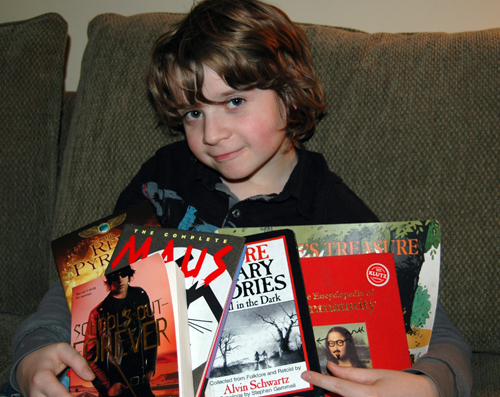Free Voluntary Reading Wins Again, or: How Norway Can Do Even Better in Academic English Development
Hellekaer (2009) examined predictors of self-assessed ability to read academic texts among 578 Norwegian university students. The ability to read academic texts in Norwegian was a clear predictor (r = .43), in agreement with claims that reading ability in the first language is related to reading ability in the second (Cummins, 1991).
 Chicago public schools fourth grader Sam Schmidt (above) had more than 20 additional hours of free reading during the second semester of the 2009 - 2010 school year and the first semester of the 2010 - 2011 school year when he was opted out of all but one of the required testings that were being given regularly to his third grade class at O.A. Thorp Scholastic Academy, which was not even on probation. During that time, Sam, who also served as elementary student news editor of Substance, was able to read a number of books, including those depicted in the photograph above. Substance photo by Sharon Schmidt.Academic study, whether in Norwegian or English classes, was not a good predictor. Taking an extra two years of English classes at the university level increased estimates of proficiency only slightly, from 4.4 to 4.8 on a scale of 1 to 7.
Chicago public schools fourth grader Sam Schmidt (above) had more than 20 additional hours of free reading during the second semester of the 2009 - 2010 school year and the first semester of the 2010 - 2011 school year when he was opted out of all but one of the required testings that were being given regularly to his third grade class at O.A. Thorp Scholastic Academy, which was not even on probation. During that time, Sam, who also served as elementary student news editor of Substance, was able to read a number of books, including those depicted in the photograph above. Substance photo by Sharon Schmidt.Academic study, whether in Norwegian or English classes, was not a good predictor. Taking an extra two years of English classes at the university level increased estimates of proficiency only slightly, from 4.4 to 4.8 on a scale of 1 to 7.
Exposure to English media (TV, films and videos without subtitles) had a positive but modest relationship to proficiency (r= .30).
The clear winner was reading for pleasure. Those who reported reading more English novels had higher proficiency (r = .47), and a combination of students' reports of their reading novels, magazines, periodicals and reading on the internet produced a slightly higher correlation, r = .55 (r2 = .3). This confirms the claim that pleasure reading provides a bridge that makes academic reading more comprehensible (Krashen, 2010).
Few of the students reported much reading: Hellekjaer provides few details, but they are compelling: Only half of the students had read 16 or more novels, and only 18% could be described as dedicated pleasure readers, reading 51 or more novels.
Hellekjaer concludes that "extracurricular reading is the most important predicator of academic English reading proficiency found in this study (p. 210), but the modest amount of novel reading reported suggests that Norway has not fully tapped the potential of free voluntary reading.
Cummins, J. 1991. Interdependence of first- and second-language proficiency in bilingual children. In Language Processing in Bilingual Children, E. Bialystok (Ed.) Cambridge University Press.
Hellekjær, Glenn Ole. 2009. Academic English reading proficiency at the university level: A Norwegian case study. Reading in a Foreign Language 21 (2): 198-222. (Note: Reading in a Foreign Language in an open-access journal.)
Krashen, S. 2010. Academic Language Proficiency: Acquired or Learned? Paper presented at the Nineteenth International Symposium on English Teaching, English Teachers' Association, Taipei.


By: Milka Pejovic
Child literacy
1/3 of Americans will never read another book after leaving high school.
42% of college graduates never read another book after college.
80% of US families didn't buy or read a book last year.
With scary statistics like these, you wonder if child literacy is the only culprit. I completely agree with the research supporting the fact that reading for pleasure is the #1 factor to encourage reading in children, and in adults.
I always encourage kids and adults to read "whatever they like to read", even if it may look boring to other people. If they read for pleasure, eventually their reading horizons will expand.
So many parents don't read with their kids at home today because they're "too busy", it's just sad...